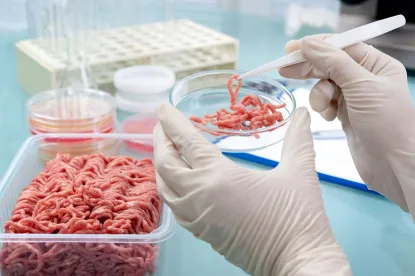Producers of cell-cultured meat – synthetic meat products derived from animal cell cultures that are intended to simulate the taste, appearance, and texture of traditional animal products – may soon receive regulatory direction from Congress. On December 16, 2019, Senators Mike Enzi (WY) and Jon Tester (MT) introduced legislation to codify a joint agreement between the U.S. Food & Drug Administration (FDA) and the U.S. Department of Agriculture (USDA) regulating the development and sale of cell-cultured meat products. The legislation aims to address ongoing uncertainty over which federal agency should regulate the cell culture development process, and would assign authority to USDA to establish appropriate label terms for cell-cultured meat products. The bill arrives even as a number of states have recently acted to prohibit cell-cultured meat products from being labeled as “meat” – and are now facing lawsuits in federal court.
Cell-cultured meat, also called lab-grown meat or “clean meat,” is grown in a sterile laboratory environment. The cell cultures are drawn from either a live or slaughtered animal and grown in a complex multi-step process.[1] They are differentiated and matured to simulate traditional meat products while avoiding many of the environmental impacts associated with traditional animal husbandry. Technology advocates state that cell-cultured meat reduces feed costs, crop footprints, greenhouse gas emissions, and water consumption.
But cell-cultured meat products have not yet been able to offer these benefits at scale, owing in part to high costs currently associated with development and production. Regulatory uncertainty has also created challenges, as regulators have grappled over which federal agency should have primary oversight over the cell-cultured meat production process: while USDA regulates and inspects meat and poultry, FDA generally regulates all other food products to ensure that they are safe for human consumption and labeled accurately. This longstanding framework has prompted a challenging question for regulators and stakeholders alike: should cell-cultured meat products be regulated by USDA under its authority over traditional meat and poultry products, or by FDA, which has historically regulated the types of food manufacturing facilities and laboratories where cell-cultured meat will be grown and produced?
The agencies have already offered their commitment to work together. In November 2018, USDA and FDA issued a press release articulating a joint framework for robust collaboration, wherein FDA would oversee the stages of production from cell collection to differentiation, while USDA would regulate all subsequent processing, packing, and labeling of the products.[2] The agencies formalized their joint agreement in March 2018.
Responding to concerns from livestock industry groups and other stakeholders, a number of states (including Arkansas, Louisiana, Missouri, Mississippi, and Wyoming) subsequently passed laws to prohibit certain animal-derived food products from being labeled as “meat” or a “meat food product.” Several of those laws were subsequently challenged in lawsuits brought by public interest groups.
In the wake of these legal challenges, Senators Enzi and Tester introduced the “Food Safety Modernization for Innovative Technologies Act” (Senate Bill 3053) on December 16.[3] The bill draws from the Joint Agreement and aims to clarify that FDA will oversee the initial cell collection, proliferation, and culturing processes while transferring regulatory oversight of the harvested cells to USDA for regulation related to further processing and packaging. Significantly, the bill provides USDA with exclusive authority over labeling requirements for cell-cultured meat products derived from cell lines of livestock or poultry and assigns USDA with responsibility for establishing “appropriate nomenclature” for these product labels. The bill also requires the FDA and USDA to share information and collaborate during cell differentiation and harvesting. As of this date, the bill has been referred to the Committee on Agriculture, Nutrition, and Forestry and has yet to face a vote.
[1] See Alan Sachs & Sarah Kettenmann, A Burger by Any Other Name, 15 SciTech Lawyer 19 (Winter 2019).
[2] U.S. Dept Agric., Statement from USDA Secretary Perdue and FDA Commissioner Gottlieb on the Regulation of Cell-Cultured Food Products from Cell Lines of Livestock and Poultry, Release No. 0248.18, Nov 16, 2018, available at https://www.usda.gov/media/press-releases/2018/11/16/statement-usda-secretary-perdue-and-fda-commissioner-gottlieb.
[3] Food Safety Modernization for Innovative Technologies Act, S. 3053, 116th Cong. (2019).




 />i
/>i
